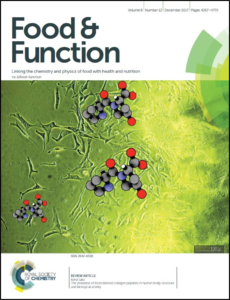Food & Function sponsored two poster prizes at the recent Bioavailability meeting in Norwich.
Congratulations to the winners: Essi Paivarinta and E Wood!
Will you be at Bioavailability 2018, September 10-13, Norwich, UK?
The Bioavailability 2018 conference aims to provide an open forum to bring together researchers from various scientific communities to present the latest research and discuss common themes and challenges to understanding the bioavailability of micronutrients and bioactive compounds for improved public health. The role of the gut microbiota and factors affecting individual variation in the bioavailability of both nutrients and non-nutrients will be strong themes of the conference.
Food & Function will be sponsoring two poster prizes, so best of luck!
 |
Rebecca Brodie, Deputy Editor, Food & Function, will be attending.
Please feel free to get in touch with me to arrange a meeting: I look forward to meeting you in Norwich! |
 |
The School of Food Science & Nutrition, University of Leeds hosted the successful 17th Food Colloids Conference: Application of Soft Matter Concepts, which took place between 8th – 11th April 2018.
The conference welcomed 300 delegates from 29 nations who attended the conference to learn, network and engage with the Food Colloids research that was presented. The event was not only special as it marked the return of the conference to the UK after 14 years but also because of the record-breaking number of attendees, number of countries represented and high quality posters in the conferences’ history.
The conference boasted 182 posters that were on display in the iconic Parkinson building throughout the event to maximize exposure to the cutting edge research. All students were entered into the Poster Prize which was sponsored by Food & Function. The three winners of the competition were: Morfo Zembyla (University of Leeds) Stabilization of water-in-oil emulsions using food grade materials, Judith Wemmer (ETH Zurich) Integration of laccase-mediated polymerization in processing of biopolymer mixtures and Mamisoa Nomena (University of Amsterdam) Drying of cellulose microfibril stabilized emulsions.
Poster Prize winner Morfo Zembyla stated: “It was a successful and highly stimulating conference providing a great opportunity to discuss science with academic and industrial people from all over the world. My poster was awarded with the Food & Function poster prize and I am glad to see my work being recognized and rewarded. I kindly thank my supervisors, Prof Brent Murray, Dr Anwesha Sarkar (both from University of Leeds) and Dr Stewart Radford (Nestlé), for their support and guidance.”
The University of Leeds is home to the biggest and most highly cited Food Colloids and Processing academic group in Europe. The Food Colloids Group at the University of Leeds is internationally acclaimed for its interdisciplinary research worldwide, ranked first in Europe and third in the World according to field-weighted citation impact in Food Colloids, making it an ideal location for the conference destination, alongside it originating in Leeds.
Anwesha Sarkar, Associate Professor of Food Colloids at the School of Food Science & Nutrition at the University of Leeds, who is the conference chair commented: “We are delighted with the incredible success of our recent conference held in Leeds, and felt it truly highlighted the excellent conferencing facilities the city has to offer. The event offered an ideal environment for inspiring scientific conversation, with new knowledge uncovered as Food Colloids research reaches an important crossroad with paradigm shift towards ‘tailored’ food design for improving nutrition and human health.
There was a strong focus on the use of advanced structural characterization techniques that ranged from macro scale to few nanometers to understand complex food structures being presented by experts from various disciplines (from food science to pharmaceutical science to physics to mechanical engineering to biology). The buzzing city of Leeds also has a vibrant multi-cultural aspect and it is only a few miles from the beautiful Yorkshire countryside, where we had the opportunity to sightsee during the social event organized for the conference delegates – we are aiming to visit again soon!”
by Sameera Rafiq, Research Support Officer
School of Food Science and Nutrition, University of Leeds
Notes to editors
Food Colloids is a biennial conference in the field of physical chemistry of complex foods. The subject area of the conference is physical chemistry of complex food systems with special emphasis on macromolecules that structure food. The aim is to expand knowledge on how interactions between food components create multi-phase structures on different length scales.
For more information on Food Colloids and its upcoming conference, please visit: http://www.foodcolloids2018.co.uk/
Will you be at Food Colloids 2018, April 9-11, in Leeds, UK?
Food Colloids is a biennial conference in the field of physical chemistry of complex foods. The main theme of this conference is ‘Application of Soft Matter Concepts’ and the scientific sessions will cover a series of topics illustrating the interplay between fundamental colloid science research and more applied soft matter research.
Food & Function will be sponsoring the three student poster prizes, so best of luck!
 |
Rebecca Brodie, Deputy Editor, Food & Function
Please feel free to get in touch with me before the conference to arrange a meeting: food-rsc@rsc.org I look forward to meeting you in Leeds! |
 |
We are delighted to announce that Christine Morand has taken over as Editor-in-Chief of Food & Function.
 Christine Morand is a full research director at the French National Institute for Agricultural Research (INRA), in the division “Nutrition, Chemical and Food Safety, Consumers behaviours” and works in the Human Nutrition Unit where she leads a research group focusing on diet, plant food bioactives and vascular health. She obtained her MS (1985) and PhD (1991) in cellular and molecular biology from the Blaise Pascal University of Clermont-Ferrand and her Habilitation to supervise research (2005) from the University of Auvergne.
Christine Morand is a full research director at the French National Institute for Agricultural Research (INRA), in the division “Nutrition, Chemical and Food Safety, Consumers behaviours” and works in the Human Nutrition Unit where she leads a research group focusing on diet, plant food bioactives and vascular health. She obtained her MS (1985) and PhD (1991) in cellular and molecular biology from the Blaise Pascal University of Clermont-Ferrand and her Habilitation to supervise research (2005) from the University of Auvergne.
She has been working for 12 years in the field of Nutrition & Health to study the role of dietary polyphenols in the prevention of cardiovascular diseases through a translational approach. This research includes human intervention studies with non-invasive assessment of vascular function, supplementation studies in animal models of atherosclerosis and cell experiments on vascular and immune cells. Previously, she worked on the absorption and metabolism of dietary polyphenols and on the splanchnic metabolism of nutrients. She belonged to the research group of INRA that have initiated the 1st International Conference on Polyphenols and Health (Vichy, 2003) and she chaired in 2015 its 7th edition in Tours (France). Presently, she chairs the COST-Action POSITIVe-FA1403, addressing through a multidimensional approach, the complexity of the interindividual variation in response (bioavailability and bioactivity) to the consumption of plant food bioactives in relation to cardiometabolic health (http://www6.inra.fr/cost-positive).
We recently had a chance to catch up with Christine to talk about her plans for the journal.
What are you most looking forward to in your new role as Editor-in-Chief and what are your aims?
A better understanding of the role of foods in preservation of the main physiological functions of the body constitutes an exciting area of research of the 21st Century with large prospects of innovation. Food & Function provides a unique platform for research related to the chemical and physical properties of food constituents, their fate in the body and their nutritional and health benefits in humans and I am very honoured and happy to be on the board of the journal. Also I’d like to acknowledge my eminent predecessors: Professor Gary Williamson, who founded the journal in 2010, and to Professor Kevin Croft, who succeeded him from 2014, whose vision and involvement laid to an outstanding recognition of the journal in less than ten years (IF 3.247). As new Editor-in-Chief of Food & Function, my most fervent hope is to work in close connection with the members of the editorial board, advisory board and editorial office to continue the current momentum and ensure the success of the journal by publishing high quality research ranging from foods to human studies.
What direction do you see this research field moving in and what do you imagine will be the next big breakthrough?
There is a general consensus that dietary habits and foods are key drivers for the maintenance of health through life. However, a lot of research is still needed to provide science-based knowledge on which we will be able to refine dietary recommendations regarding some specific foods or food components, to design foods targeting specific groups of population and thereby evolve towards the development of personalized nutrition.
Reaching this goal implies the development of more and more multidisciplinary research associating food scientists, microbiologists, physiologists and nutritionists, together with the use of breakthrough technologies (omics and computational) for a full characterisation of the complexity of the interactions between foods and human health. Completing this challenge will not be an easy task but so exciting for a new generation of researchers who will provide sound science that will lead undoubtedly to significant and concrete innovations in the field of foods, health and well-being.
Can you select one paper from 2017 in Food & Function that stood out from the crowd?
Rather than selecting among several hundred publications, one paper standing out from the crowd in 2017, I’d like to underline my interest for several in-depth reviews, published in regular issues or in themed collections, that provided both expert and non-expert scientists a comprehensive overview on a diversity of topics, ranging from peptides and human health, fate in the body and health properties of phenolic compounds, food structures and perception, microalgae and functional foods, and so forth. Regarding full papers reporting primary research, I noticed the growing number of papers considering the role of gut microbiota in the conversion, metabolism and health effects of foods or the ability of foods/components to shape microbiota with potential health impacts at the intestinal or systemic levels. This complex crosstalk between foods, microbiota and health deserves further investigations and will probably constitutes another hot topic of research in the coming years.
Once again, we’d like to congratulate Christine on her new role and we look forward to her term as Editor-in-Chief.